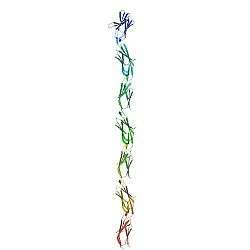CEACAM5
Carcinoembryonic antigen-related cell adhesion molecule 5 (CEACAM5) also known as CD66e (Cluster of Differentiation 66e), is a human gene.[2]
See also
References
Further reading
- Willcocks TC, Craig IW (1991). "Characterization of the genomic organization of human carcinoembryonic antigen (CEA): comparison with other family members and sequence analysis of 5' controlling region.". Genomics. 8 (3): 492–500. doi:10.1016/0888-7543(90)90036-T. PMID 2286372.
- Barnett T, Zimmermann W (1990). "Workshop report: proposed nomenclature for the carcinoembryonic antigen (CEA) gene family.". Tumour Biol. 11 (1–2): 59–63. doi:10.1159/000217643. PMID 2309067.
- Schrewe H, Thompson J, Bona M, et al. (1990). "Cloning of the complete gene for carcinoembryonic antigen: analysis of its promoter indicates a region conveying cell type-specific expression". Mol. Cell. Biol. 10 (6): 2738–48. PMC 360634
 . PMID 2342461.
. PMID 2342461.
- Kamarck ME, Elting JJ, Hart JT, et al. (1987). "Carcinoembryonic antigen family: expression in a mouse L-cell transfectant and characterization of a partial cDNA in bacteriophage lambda gt11". Proc. Natl. Acad. Sci. U.S.A. 84 (15): 5350–4. doi:10.1073/pnas.84.15.5350. PMC 298853
 . PMID 2955415.
. PMID 2955415.
- Zimmermann W, Ortlieb B, Friedrich R, von Kleist S (1987). "Isolation and characterization of cDNA clones encoding the human carcinoembryonic antigen reveal a highly conserved repeating structure". Proc. Natl. Acad. Sci. U.S.A. 84 (9): 2960–4. doi:10.1073/pnas.84.9.2960. PMC 304780
 . PMID 3033671.
. PMID 3033671.
- Barnett T, Goebel SJ, Nothdurft MA, Elting JJ (1989). "Carcinoembryonic antigen family: characterization of cDNAs coding for NCA and CEA and suggestion of nonrandom sequence variation in their conserved loop-domains". Genomics. 3 (1): 59–66. doi:10.1016/0888-7543(88)90160-7. PMID 3220478.
- Zimmermann W, Weber B, Ortlieb B, et al. (1988). "Chromosomal localization of the carcinoembryonic antigen gene family and differential expression in various tumors". Cancer Res. 48 (9): 2550–4. PMID 3356015.
- Beauchemin N, Benchimol S, Cournoyer D, et al. (1987). "Isolation and characterization of full-length functional cDNA clones for human carcinoembryonic antigen". Mol. Cell. Biol. 7 (9): 3221–30. PMC 367958
 . PMID 3670312.
. PMID 3670312.
- Oikawa S, Nakazato H, Kosaki G (1987). "Primary structure of human carcinoembryonic antigen (CEA) deduced from cDNA sequence". Biochem. Biophys. Res. Commun. 142 (2): 511–8. doi:10.1016/0006-291X(87)90304-4. PMID 3814146.
- Maruyama K, Sugano S (1994). "Oligo-capping: a simple method to replace the cap structure of eukaryotic mRNAs with oligoribonucleotides". Gene. 138 (1–2): 171–4. doi:10.1016/0378-1119(94)90802-8. PMID 8125298.
- Suzuki Y, Yoshitomo-Nakagawa K, Maruyama K, et al. (1997). "Construction and characterization of a full length-enriched and a 5'-end-enriched cDNA library". Gene. 200 (1–2): 149–56. doi:10.1016/S0378-1119(97)00411-3. PMID 9373149.
- Hart SP, Ross JA, Ross K, et al. (2000). "Molecular characterization of the surface of apoptotic neutrophils: implications for functional downregulation and recognition by phagocytes". Cell Death Differ. 7 (5): 493–503. doi:10.1038/sj.cdd.4400680. PMID 10800083.
- Guignot J, Peiffer I, Bernet-Camard MF, et al. (2000). "Recruitment of CD55 and CD66e Brush Border-Associated Glycosylphosphatidylinositol-Anchored Proteins by Members of the Afa/Dr Diffusely Adhering Family of Escherichia coli That Infect the Human Polarized Intestinal Caco-2/TC7 Cells". Infect. Immun. 68 (6): 3554–63. doi:10.1128/IAI.68.6.3554-3563.2000. PMC 97642
 . PMID 10816511.
. PMID 10816511.
- Boehm MK, Perkins SJ (2000). "Structural models for carcinoembryonic antigen and its complex with the single-chain Fv antibody molecule MFE23". FEBS Lett. 475 (1): 11–6. doi:10.1016/S0014-5793(00)01612-4. PMID 10854848.
- Screaton RA, DeMarte L, Dráber P, Stanners CP (2000). "The Specificity for the Differentiation Blocking Activity of Carcinoembryonic Antigen Resides in Its Glycophosphatidyl-Inositol Anchor". J. Cell Biol. 150 (3): 613–26. doi:10.1083/jcb.150.3.613. PMC 2175204
 . PMID 10931872.
. PMID 10931872.
- Bajenova OV, Zimmer R, Stolper E, et al. (2001). "Heterogeneous RNA-binding protein M4 is a receptor for carcinoembryonic antigen in Kupffer cells". J. Biol. Chem. 276 (33): 31067–73. doi:10.1074/jbc.M104093200. PMID 11406629.
- Wirth T, Soeth E, Czubayko F, Juhl H (2002). "Inhibition of endogenous carcinoembryonic antigen (CEA) increases the apoptotic rate of colon cancer cells and inhibits metastatic tumor growth". Clin. Exp. Metastasis. 19 (2): 155–60. doi:10.1023/A:1014566127493. PMID 11964079.
- Louhimo J, Carpelan-Holmström M, Alfthan H, et al. (2002). "Serum HCG beta, CA 72-4 and CEA are independent prognostic factors in colorectal cancer". Int. J. Cancer. 101 (6): 545–8. doi:10.1002/ijc.90009. PMID 12237895.
- Hampton R, Walker M, Marshall J, Juhl H (2002). "Differential expression of carcinoembryonic antigen (CEA) splice variants in whole blood of colon cancer patients and healthy volunteers: implication for the detection of circulating colon cancer cells". Oncogene. 21 (51): 7817–23. doi:10.1038/sj.onc.1205906. PMID 12420218.
- Strausberg RL, Feingold EA, Grouse LH, et al. (2003). "Generation and initial analysis of more than 15,000 full-length human and mouse cDNA sequences". Proc. Natl. Acad. Sci. U.S.A. 99 (26): 16899–903. doi:10.1073/pnas.242603899. PMC 139241
 . PMID 12477932.
. PMID 12477932.
External links
This article incorporates text from the United States National Library of Medicine, which is in the public domain.
|
|---|
|
| 1-50 | |
|---|
|
| 51-100 | |
|---|
|
| 101-150 | |
|---|
|
| 151-200 | |
|---|
|
| 201-250 | |
|---|
|
| 251-300 | |
|---|
|
| 301-350 | |
|---|

 . PMID 2342461.
. PMID 2342461. . PMID 2955415.
. PMID 2955415. . PMID 3033671.
. PMID 3033671. . PMID 3670312.
. PMID 3670312. . PMID 10816511.
. PMID 10816511. . PMID 10931872.
. PMID 10931872. . PMID 12477932.
. PMID 12477932.